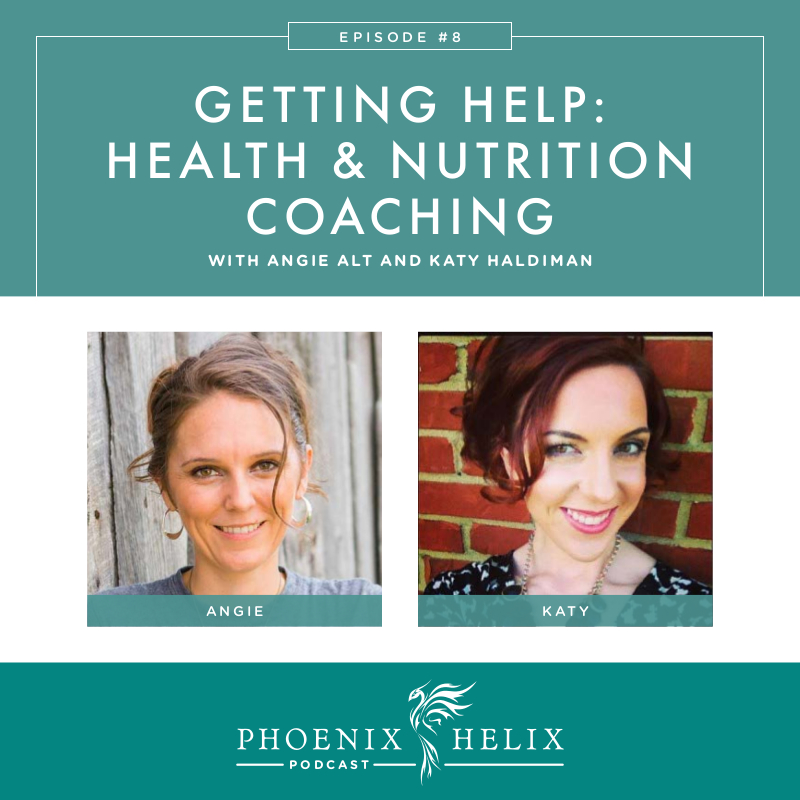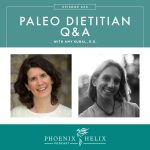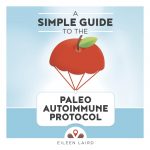We Don’t Have To Do This Alone
Maximizing autoimmune health through diet and lifestyle is hard work. The rewards are absolutely worth it, but sometimes a little extra help can make it a whole lot easier. When do we ask for that help? Most of us who choose this path are independent and self-motivated people. We’re often frustrated by the failures of conventional medicine, and have reached a point where we’re ready to take our health into our own hands. The internet is now full of information (like this blog) that points us in the right direction. Sometimes, that’s all we need.
But what if you have brain fog and can’t wrap your mind around what’s necessary to implement these changes? Or your family isn’t supportive, so you have daily obstacles and temptations making it much harder? Perhaps you’ve been on a healing diet for a while and aren’t seeing results; you need to troubleshoot and don’t know where to start. Or maybe you’ve tried to switch to paleo a few times now, but always gave up after the first week, because it’s too darn hard.
In today’s episode, I interview two people who are making autoimmune healing much easier. They both have autoimmune disease themselves, which they have improved through diet and lifestyle, and they now work professionally helping others do the same. Angie Alt is a health coach, and Katy Haldiman is a nutritional therapist. We talk about the different services they offer, and when is a good time to seek help.
Listen to the Show
- Subscribe to my podcast through your favorite podcast app: iTunes, Stitcher, Google, TuneIn, Spotify, Amazon, etc.
- You can also listen to the episode right here through the player below, and if you subscribe to my newsletter you’ll get notified of future episodes.
Podcast: Play in new window | Download
Show Notes
- Intro (0:00)
- Meet Our Guests (0:51)
- Angie Alt has Multiple Autoimmune Syndrome, which for her includes celiac, endometriosis and lichen sclerosus. She has reversed her symptoms with the help of the paleo autoimmune protocol (AIP), and now works as a health coach, helping others do the same. You can listen to her healing story on Episode 1 of this podcast.
- Katy Haldiman also has Multiple Autoimmune Syndrome, which for her includes seronegative inflammatory arthritis, Crohn’s and myasthenia gravis. She has reversed her symptoms through a combination of SCD/GAPS and the AIP. Her background is nursing, and she now works as a nutritional therapist, specializing in autoimmune disease. Katy shares her healing story with us today.
- The Difference Between Reversing Autoimmune Disease and a Cure (12:00)
- Katy got her third autoimmune diagnosis (myasthenia gravis) after following the AIP for a year. At first, she was disappointed and questioned the effectiveness of the paleo approach. Then, she remembered two important things: (1) While diagnoses happen immediately, the autoimmune process takes years to develop and started long before she went paleo. (2) Her health improved dramatically over that year: eliminating severe diarrhea from Crohn’s, and resolving debilitating joint pain from inflammatory arthritis. Also, her myasthenia gravis symptoms are so minor, they require no medical intervention.
- We all shared our own stories of coming to terms with the difference between reversing autoimmune disease and a cure. While a cure isn’t possible, the paleo diet and lifestyle can lead to major improvements, and it’s incredibly empowering that we are the ones making the difference in our own health. It’s easier to feel grateful for how far we’ve come, if we aren’t pursuing perfection.
- Health Coaching vs. Nutritional Therapy (22:22)
- Angie got her health coach training through the Institute for Integrative Nutrition (IIN). Her professional mission is to help people maintain a diet and lifestyle change for the long-term, identifying obstacles and finding support.
- Katy’s background is nursing, and she became frustrated with the limits of conventional medicine in treating chronic health issues. She got her training through the Nutritional Therapy Association (NTA). Her professional mission is to help people get at the root of their health issues, through identifying nutritional deficiencies and troubleshooting healing plateaus.
- The difference: While there is some overlap in services, health coaches generally give guidance on where to begin, and how to maintain a healing diet and lifestyle. Nutritional therapists help people troubleshoot, when diet and lifestyle isn’t enough to resolve their symptoms.
- Update 2022: Katy and Angie have retired from coaching themselves, but Angie now teaches others, and there’s now an AIP Certified Coach Directory which contains both health and nutrition coaches.
- Case Studies: Examples of People Who Have Been Helped (31:52)
- Angie helped transition a young family from a Standard American Diet to a regular paleo diet. The husband had developed fatty liver and pre-diabetes, which was concerning to both of them. Over a 4-week period, Angie helped them make the switch to paleo, finding new foods to replace old favorites. Then, she helped them refine their diet by focusing on nutrient-density for optimal healing. Lastly, she worked on stress management, because healing is about much more than just food. The result? He lost 25 pounds. His A1C went from 6.2 to 5.1, and his liver enzymes normalized, meaning he no longer has fatty liver nor pre-diabetes.
- Katy helped a client with ulcerative colitis, who was suffering from severe symptoms of frequent diarrhea and bloody stool, in spite of taking conventional medications and starting a paleo diet. After an assessment, she started him on a modified GAPS introduction diet to calm his digestive system. Then, she transitioned him to the AIP, which helped him identify which paleo foods were inflammation triggers for him. She also recommended some supplements and herbs to jump-start his healing. Results? His symptoms resolved, and he was eventually able to go off his medications, with his doctor’s support.
- Katy’s Modified GAPS Introduction Diet (40:33)
- The GAPS diet has 2 pieces: Introduction and Full Diet. The Introduction Diet is designed to soothe the digestive system by removing foods that are hard to digest, and it’s largely soup and broth-based. It’s meant to be a short-term measure to get critical symptoms under control. Unfortunately, it also includes foods that are common food intolerances for people with autoimmune disease, like eggs, nuts and dairy. Katy modifies the diet to remove these foods.
- When to Seek Help (43:17)
- Angie works with a lot of people who tried going AIP cold-turkey, but didn’t make it more than a week, because they found it too hard both physically and emotionally. Angie prefers a gentler approach. You don’t have to do it all at once. She provides the tools and supports for you to make the transition successfully.
- Katy often works with people who have been “through the wringer.” They’ve worked with a number of practitioners, have tried diet and lifestyle approaches, but are still having symptoms. She’s an expert at paleo nutrition-based troubleshooting
- What Is Beyond Their Scope of Practice? (46:45)
- Angie and Katy are qualified professionals, but there are times when they refer people to specialists: (1) If people have SIBO symptoms, both Katy and Angie refer them for testing, diagnosis and treatment. (2) If people have autoimmune symptoms but no diagnosis, Katy also refers them for testing. (3) Any time someone has a condition that could benefit from conventional medical care, they will refer accordingly. Conventional medicine often excels at addressing acute problems; and then Katy and Angie can work with their clients on the root causes behind those problems. (4) While the gut-brain connection means that diet can powerfully improve mental health symptoms, sometimes people need help beyond diet, and Angie will refer to a psychiatrist in those cases. (5) Both Angie and Katy also refer people with eating disorders to a specialist.
- Budget Options for Health and Nutrition Coaching (53:51)
- Update 2022: Angie and Katy have stopped offering group coaching classes themselves, but there’s now a platform called WellTheory that combines AIP coaching with a group membership, with the goal of making it affordable to everyone.
- Outro (59:13)
- Update 2022: Katy has retired her nutritional therapy practice and is currently nursing full-time. While Angie is no longer accepting 1:1 clients, she continues to be an active leader and researcher in the AIP community, and you can follow her work through her website: Autoimmune Wellness. If you’re looking for 1:1 help, there’s now an AIP Certified Coach Directory, which contains both health and nutrition coaches.
- Eileen (your podcast host) is the author of multiple books, written to help people thrive with autoimmune disease. Learn more on the Books Page.
- If you like this podcast, follow or subscribe through your favorite podcast app. You can also subscribe to Eileen’s biweekly newsletter.
- Check out the entire archive of podcast episodes.
You May Also Be Interested In
Spreading the Word
If you like the podcast, please leave a positive review in iTunes. It would mean the world to me, and also helps others find the podcast. Here are some quick instructions using your iPhone:
- If you are already subscribed to my podcast: (1) Click the purple podcast icon. (2) At the bottom of the screen, click Library. (3) At the top of the screen, click Shows. (4) Click the Phoenix Helix podcast image. (5) Scroll down the page, and you’ll see Ratings and Reviews. Scroll down a little bit more and click on Write a Review. This will bring up the review screen. Tap 5 stars (if you love the podcast), and then click in the title box, and it will bring up the keyboard. Enter a title and short review. (6) Click Send in the upper right corner. (7) Thank you! Positive reviews give the podcast a higher search ranking in iTunes, helping people find it and letting them know it’s a quality podcast and worth their time to listen.
- If you haven’t subscribed to my podcast: (1) Click the purple podcast icon. (2) In the lower right corner, click the magnifying class. (3) Type Phoenix Helix in the search box. (4) Click the podcast cover in the Show list. (5) If you’d like to subscribe, click the + sign at the top of the screen. (6) To write a review, scroll down the page, and you’ll see Ratings and Reviews. Scroll down a little bit more and click on Write a Review. This will bring up the review screen. Tap 5 stars (if you love the podcast), and then click in the title box, and it will bring up the keyboard. Enter a title and short review. (7) Click Send in the upper right corner. (8) Thank you! Positive reviews give the podcast a higher search ranking in iTunes, helping people find it and letting them know it’s a quality podcast and worth their time to listen.









Comments are closed.